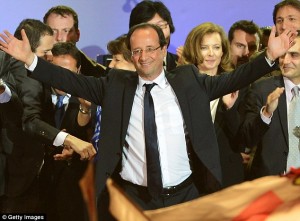 Virtually every poll this year had Socialist Francois Hollande defeating conservative (incumbent) Nicolas Sarkozy. And those polls were vindicated when Hollande came out on top in the first round of elections for the Elysée two weeks ago. This is why it came as no surprise when he handily defeated Sarkozy in a runoff yesterday (52 to 48 percent).
Virtually every poll this year had Socialist Francois Hollande defeating conservative (incumbent) Nicolas Sarkozy. And those polls were vindicated when Hollande came out on top in the first round of elections for the Elysée two weeks ago. This is why it came as no surprise when he handily defeated Sarkozy in a runoff yesterday (52 to 48 percent).
Now, to enhance his story, the media (even in France) are propagating a narrative about Hollande rising up from virtual obscurity to become only the second socialist president in French history. (His mentor François Mitterrand was the first to be elected in 1981.) But Hollande is not nearly as unknown as reports suggest. Not least because he presided as Socialist Party leader for over a decade and was involved in one of the most intimate and scandalous political power struggles in French history.
Here, in part, is why his rise to power was more accidental than obscure:
Every French newspaper is emblazoned with headlines about the intriguing split between Segolene Royal, the Socialist candidate I endorsed in last month’s French presidential election, and Francois Hollande, the leader of the Socialist Party… [T]hese two have been ‘partners’ forever (30 years) and have four children, but never bothered to marry….
(Royal claims that she ended their relationship because Hollande was having an affair with journalist Valerie Trierweiler. Never mind reports that she has been a consenting, though frigid, party to this ménage a trois for years.) But what intrigues me about this split is not the announcement of it… Instead, I’m intrigued by the apparent fact that Royal’s resounding defeat precipitated not only the dissolution of her and Hollande’s personal relationship but also the termination of their political partnership.
Moreover, as if this split were not already sensational enough, the French are salivating with prurient anticipation now that Royal has declared her (woman-scorned) intent to challenge Hollande for leadership of the Socialist Party – a position he has held like political Svengali for 10 years.
(“Segolene Royal and Francois Hollande divorce French Style,” The iPINIONS Journal, June 19, 2007)
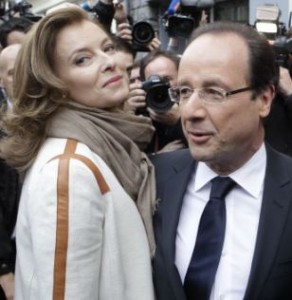 Incidentally, the woman standing next to Hollande during his victory celebration last night was his former mistress, now acknowledged “companion,” Valerie — which must make his former companion Segolene doubly green with envy. (Sarkozy’s supermodel wife Carla Bruni might have been a pushy, self-absorbed shrew, but at least he had the decency to make an honest woman of her. It remains to be seen if Hollande will do the same for Valerie – who by all accounts is an equally pushy, self-absorbed shrew.) But his patently unconventional private life, coupled with his bona fide status as a member of the French elite, clearly makes a mockery of his claim that he is “Mr. Normal.”
Incidentally, the woman standing next to Hollande during his victory celebration last night was his former mistress, now acknowledged “companion,” Valerie — which must make his former companion Segolene doubly green with envy. (Sarkozy’s supermodel wife Carla Bruni might have been a pushy, self-absorbed shrew, but at least he had the decency to make an honest woman of her. It remains to be seen if Hollande will do the same for Valerie – who by all accounts is an equally pushy, self-absorbed shrew.) But his patently unconventional private life, coupled with his bona fide status as a member of the French elite, clearly makes a mockery of his claim that he is “Mr. Normal.”
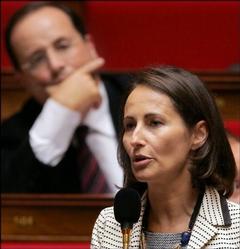 At any rate, it was hardly surprising that everyone wrote Hollande’s political obituary after his embarrassing split with Royal forced him to resign as party leader. Likewise, after her disastrous performance against Sarkozy in 2007, nobody thought Royal stood a snowballs chance in hell of upsetting an incumbent Sarkozy in 2012. But there’s no denying that they were being written off in each case because IMF head Dominique Strauss-Khan (DSK) was waiting in the wings like a deus ex machina to lead the Socialist Party against Sarkozy.
At any rate, it was hardly surprising that everyone wrote Hollande’s political obituary after his embarrassing split with Royal forced him to resign as party leader. Likewise, after her disastrous performance against Sarkozy in 2007, nobody thought Royal stood a snowballs chance in hell of upsetting an incumbent Sarkozy in 2012. But there’s no denying that they were being written off in each case because IMF head Dominique Strauss-Khan (DSK) was waiting in the wings like a deus ex machina to lead the Socialist Party against Sarkozy.
Which brings me to the accidental aspect of Hollande’s rise. Because here, in short, is how DSK destroyed what seemed to be the hope of all of France for his candidacy:
DSK … was yanked from his first-class seat on board an Air France flight last night just as it was about to depart New York bound for Paris. Detectives from New York’s Special Victims Unit arrested and charged him with a criminal sex act, attempted rape, and unlawful imprisonment.
French President Nicolas Sarkozy is probably just as gratified as DSK’s silent victims by this arrest. After all, the consensus opinion among political pundits in France was that he was the only person who could deny Sarkozy’s bid to get re-elected next year.
(“The Arrest of IMF Head Dominique Strauss-Khan,” The iPINIONS Journal, May 16, 2011)
Even though Hollande and Royal’s personal relationship was clearly over, DSK’s arrest provided the opportunity for them to settle the unfinished business of their political relationship. They were still among the most popular members of the socialist party and duly threw their hats into last fall’s Socialist Party presidential primary, along with four others. Alas, Royal did not even make the runoff, which Hollande easily won against Martine Aubry.
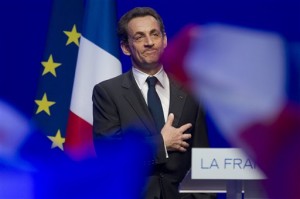 Meanwhile, disaffected and disillusioned voters were throwing out nine European leaders who prescribed austerity measures as the bitter pill to cure their ailing economies and manage their debt crisis . Nowhere was this demonstrated in more foreboding fashion for Sarkozy than in Greece with the unceremonious fall of Prime Minister George Papandreou last November.
Meanwhile, disaffected and disillusioned voters were throwing out nine European leaders who prescribed austerity measures as the bitter pill to cure their ailing economies and manage their debt crisis . Nowhere was this demonstrated in more foreboding fashion for Sarkozy than in Greece with the unceremonious fall of Prime Minister George Papandreou last November.
After all, Sarkozy was not just Europe’s poster boy for the cocktail of austerity measures (most notably cutting public benefits and government services) that have become so universally unpopular, he and Chancellor Angela Merkel of Germany effectively concocted them.
On the other hand, Hollande predicated his candidacy on a completely different panacea, focusing more on increasing government spending and raising taxes (on the filthy rich) to stimulate economic growth than on cutting services (to the chronically poor) to lower government debt. He even pledged to renegotiate the Sarkozy-Merkel debt-reduction “fiscal pact,” mocking it by offering a government-spending “growth pact” instead.
I am sure that when the result was announced, in many European countries there was relief, hope and the notion that finally austerity can no longer be the only option. And this is the mission that is now mine — to give the European project a dimension of growth, employment, prosperity, in short, a future.
(Hollande, Associated Press, May 6, 2012)
Given voter anger and frustration with austerity measures that are doing little to improve the economy but lots to make their lives more miserable, I predict Hollande will have far greater success in this mission than most pundits are predicting. He will be championing the economic stimulus philosophy made famous by John Maynard Keynes while Merkel will continue to champion the economic austerity philosophy made famous by Friedrich Hayek.
I applaud Obama for finally proposing a Keynesian jobs bill that focuses more on government spending to rebuild the country’s infrastructure and improve other areas (like education and law enforcement).
(“Rational Markets vs. Keynesian economics,” The iPINIONS Journal, September 23, 2011)
More to the point, notwithstanding the cogency of his economic philosophy, Hollande will win his battle of wits with Merkel because – as Republican presidential candidate Jon Huntsman said of now presumptive Republican presidential nominee Mitt Romney – most politicians are little more than perfectly lubricated weathervanes on all important issues.
Accordingly, there’s no doubt that national leaders will be doing all they can to avoid Sarkozy’s fate by espousing (even implementing) as many of Hollande’s policies as possible. And those hoping to defeat incumbents will be doing all they can to emulate Hollande.
Interestingly enough, this latter prospect is already on display. Because Romney wasted no time in trying to spin Hollande’s victory as the triumph of a challenger over an incumbent whose economic policies have failed. Except that Romney has spent the last year promising to implement many of the same economic policies (i.e., austerity measures) that led to Sarkozy’s demise. Whereas, President Obama has been battling a doctrinaire Republican Congress throughout his entire presidency (to no avail) to implement the very measures Hollande hopes to implement pursuant to his growth pact.
Therefore, despite Romney’s attempts to put the curse of incumbency on Obama, I have no doubt that Sarkozy’s defeat is a bad omen for him, not the president.
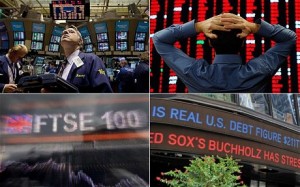 That said, his defeat in France and the defeat of the two main political parties in Greece (all for backing the Sarkozy-Merkel austerity measures) will undoubtedly trigger upheaval in the financial markets worldwide … in the short term. After all, Sarkozy and Merkel effectively imposed these measures upon the Greeks not just as a condition to receive a financial package to ward off economic default, but also to prevent their contagion from infecting the rest of Europe. Now all bets are off….
That said, his defeat in France and the defeat of the two main political parties in Greece (all for backing the Sarkozy-Merkel austerity measures) will undoubtedly trigger upheaval in the financial markets worldwide … in the short term. After all, Sarkozy and Merkel effectively imposed these measures upon the Greeks not just as a condition to receive a financial package to ward off economic default, but also to prevent their contagion from infecting the rest of Europe. Now all bets are off….
Apropos of bets, this is bound to be a down day on Wall Street because traders in the United States invariably react to every sign of economic uncertainty in Europe as if it were the beginning of a new Great Depression. This is the domino effect globalization – with its interconnectedness and interdependence – has wrought.
Related commentaries:
Segolene and Hollande…
Arrest of DSK…
Rational Markets vs. Keynesian economics